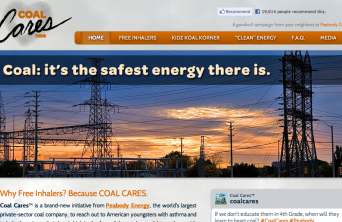Counter Attack: The 'Coal Cares' Hoax
On Tuesday, newly formed environmental group Coal is Killing Kids (CKK) disguised itself as Peabody Energy Corp., the self-proclaimed world's largest coal company, to launch a campaign called 'Coal Cares'.
The part-hoax, part-satire campaign features a tongue-in-cheek argument against renewable energy sources, touting the dangers of "violent" solar energy and how wind energy could prove disastrous:
"Namely, that the flapping of a butterfly’s wings in the wilds of Rio Grande do Sul, Brazil, can set off a massive, community-shattering tornado in Bunker Hill Village, Texas. If, as scientists state, a mere butterfly can cause a tornado so many thousands of miles away, imagine what a hill-full of wind turbines can do."
It was later revealed that CKK worked with culture-jamming activist group The Yes Men -- most known for their abrasive "identity correction" actions against large corporations, such as Dow Chemical and GE -- to develop its sardonic attack.
Most notably, the website features an order form for free "Puff-Puff" inhalers for children within a 200-mile radius of any coal plant. In an effort to de-stigmatize asthma among children, they come decorated -- from a portrait of Justin Bieber to a bedazzled glittery gleam of rhinestones.
Janet Bellamy, a spokesperson for CKK, admitted that the attack may be perceived as "tasteless", but said the organization was merely fighting fire with fire.
"Sure, it’s kind of tasteless to say that ‘Bieber’ inhalers are a solution to childhood asthma, but it's a great deal more tasteless to cause that asthma in the first place, as coal-fired power plants have been proven to do."
'Coal Cares' didn't fool anyone into believing it actually came from the energy company, however it did cause the real Peabody Energy Corp. to release a statement. The company said the campaign's website made "inaccurate claims about Peabody and coal."
In an effort to redeem its industry from the attack, Peabody also included this alleged factoid in its press release:
“The United Nations has linked life expectancy, educational attainment and income with per-capita electricity use, and the World Resources Institute found that for every tenfold increase in per-capita energy use, individuals live 10 years longer.”
To which World Resources Institute quickly responded:
"First, WRI has never made such an assertion and has never done analysis to that effect. Second, this conclusion ignores critical factors related to energy production and human health."
(WRI also said that Peabody Corp probably lifted the original statement from a similar-looking, yet unaffiliated blog source.)
Julia Gohlke, an environmental health expert at the University of Alabama, filled Wired Magazine in on those "critical factors," as she just released a paper on the subject for Environmental Health Perspectives. She explained how the parallel between energy consumption and quality of life is a lot more complicated:
“That relationship completely breaks down when we’re looking at the infant mortality levels and life expectancy levels that we enjoy in the United States... In fact, what you see is a negative impact on health when you look at coal versus other fuels.”






